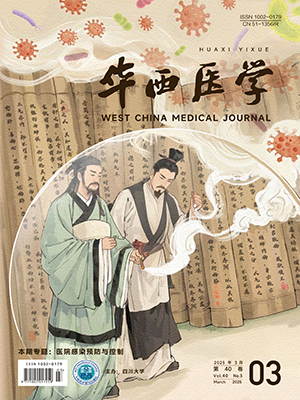| 1. |
Chen Y, Chen Y, Liu P, et al. Risk factors and mortality for elderly patients with bloodstream infection of carbapenem resistance Klebsiella pneumoniae: a 10-year longitudinal study. BMC Geriatr, 2022, 22(1): 573.
|
| 2. |
Sun QL, Gu D, Wang Q, et al. Dynamic colonization of Klebsiella pneumoniae isolates in gastrointestinal tract of intensive care patients. Front Microbiol, 2019, 10: 230.
|
| 3. |
Gorrie CL, Mirceta M, Wick RR, et al. Gastrointestinal carriage is a major reservoir of Klebsiella pneumoniae infection in intensive care patients. Clin Infect Dis, 2017, 65(2): 208-215.
|
| 4. |
Zeng M, Xia J, Zong Z, et al. Guidelines for the diagnosis, treatment, prevention and control of infections caused by carbapenem-resistant Gram-negative bacilli. J Microbiol Immunol Infect, 2023, 56(4): 653-671.
|
| 5. |
杨启文, 吴安华, 胡必杰, 等. 临床重要耐药菌感染传播防控策略专家共识. 中国感染控制杂志, 2021, 20(1): 1-14.
|
| 6. |
中国碳青霉烯耐药肠杆菌科细菌感染诊治与防控专家共识编写组, 中国医药教育协会感染疾病专业委员会, 中华医学会细菌感染与耐药防控专业委员会. 中国碳青霉烯耐药肠杆菌科细菌感染诊治与防控专家共识. 中华医学杂志, 2021, 101(36): 2850-2860.
|
| 7. |
周梦兰, 徐英春, 赵玉沛. 全基因组测序在病原微生物学中的应用及研究进展. 中华检验医学杂志, 2016, 39(4): 319-321.
|
| 8. |
乔甫. 全基因组测序在追踪医院感染暴发中的应用. 华西医学, 2019, 34(3): 334-337.
|
| 9. |
Xiong L, Su L, Tan H, et al. Molecular epidemiological analysis of ST11-K64 extensively drug-resistant Klebsiella pneumoniae infections outbreak in intensive care and neurosurgery units based on whole-genome sequencing. Front Microbiol, 2021, 12: 709356.
|
| 10. |
Rubin LG, Beachy J, Matz T, et al. Prolonged outbreak of clonal, mupirocin-resistant methicillin-resistant Staphylococcus aureus in a neonatal intensive care unit: association with personnel and a possible environmental reservoir, analyzed using whole genome sequencing. Am J Infect Control, 2022, 50(6): 680-685.
|
| 11. |
Fontana C, Angeletti S, Mirandola W, et al. Whole genome sequencing of carbapenem-resistant Klebsiella pneumoniae: evolutionary analysis for outbreak investigation. Future Microbiol, 2020, 15: 203-212.
|
| 12. |
Tesfa T, Mitiku H, Edae M, et al. Prevalence and incidence of carbapenem-resistant K. pneumoniae colonization: systematic review and meta-analysis. Syst Rev, 2022, 11(1): 240.
|
| 13. |
康霞, 黄文治, 卫丽, 等. 急诊重症监护室多重耐药菌主动筛查的流行病学研究. 华西医学, 2021, 36(3): 328-333.
|
| 14. |
史庆丰, 蒋良芝, 李春燕, 等. 碳青霉烯酶的起源与进化及流行和传播. 中华医院感染学杂志, 2018, 28(9): 1424-1428.
|
| 15. |
Zhang R, Liu L, Zhou H, et al. Nationwide surveillance of clinical carbapenem-resistant Enterobacteriaceae (CRE) strains in China. EBioMedicine, 2017, 19: 98-106.
|
| 16. |
Zhang Y, Yang X, Liu C, et al. Increased clonal dissemination of OXA-232-producing ST15 Klebsiella pneumoniae in Zhejiang, China from 2018 to 2021. Infect Dis Poverty, 2023, 12(1): 25.
|
| 17. |
黄雅轩, 蔡依含, 何婉霞, 等. 高毒力和碳青霉烯耐药肺炎克雷伯菌血流感染临床及分子流行病学特征. 中华医院感染学杂志, 2023, 33(22): 3417-3422.
|
| 18. |
陈森, 魏巍, 刘杰, 等. 重症医学科分离广泛耐药高毒力肺炎克雷伯菌XJ-K1与XJ-K2耐药特征、毒力因子及克隆分型. 中华医院感染学杂志, 2023, 33(7): 961-965.
|
| 19. |
董秀涛, 崔晓笛, 石晓红. 高毒力肺炎克雷伯菌的微生物学特征与毒力因子研究进展. 国际检验医学杂志, 2023, 44(11): 1382-1387.
|
| 20. |
Gu DX, Huang YL, Ma JH, et al. Detection of colistin resistance gene mcr-1 in hypervirulent Klebsiella pneumoniae and Escherichia coli isolates from an infant with diarrhea in China. Antimicrob Agents Chemother, 2016, 60(8): 5099-5100.
|
| 21. |
Russo TA, Olson R, Fang CT, et al. Identification of biomarkers for differentiation of hypervirulent Klebsiella pneumoniae from classical K. pneumoniae. J Clin Microbiol, 2018, 56(9): e00776-e00818.
|
| 22. |
周浩泽, 黎敏, 鲁卫平, 等. 医院分离高毒力肺炎克雷伯菌的毒力基因检测及耐药性分析. 中国消毒学杂志, 2023, 40(6): 412-415, 418.
|
| 23. |
张冬梅, 孙雅玲, 胡帆, 等. 医院获得性肺炎患者耐碳青霉烯类肺炎克雷伯菌分离株的耐药基因及毒力因子. 中华医院感染学杂志, 2023, 33(9): 1281-1284.
|
| 24. |
Hennequin C, Robin F. Correlation between antimicrobial resistance and virulence in Klebsiella pneumoniae. Eur J Clin Microbiol Infect Dis, 2016, 35(3): 333-341.
|
| 25. |
He Z, Xu W, Zhao H, et al. Epidemiological characteristics an outbreak of ST11 multidrug-resistant and hypervirulent Klebsiella pneumoniae in Anhui, China. Front Microbiol, 2022, 13: 996753.
|
| 26. |
Hu Y, Liu C, Shen Z, et al. Prevalence, risk factors and molecular epidemiology of carbapenem-resistant Klebsiella pneumoniae in patients from Zhejiang, China, 2008-2018. Emerg Microbes Infect, 2020, 9(1): 1771-1779.
|
| 27. |
Liao W, Liu Y, Zhang W. Virulence evolution, molecular mechanisms of resistance and prevalence of ST11 carbapenem-resistant Klebsiella pneumoniae in China: a review over the last 10 years. J Glob Antimicrob Resist, 2020, 23: 174-180.
|
| 28. |
Zheng Y, Yue C, Zhang H, et al. Deoxycholic acid and lithocholic acid alleviate liver injury and inflammation in mice with Klebsiella pneumoniae-induced liver abscess and bacteremia. J Inflamm Res, 2021, 14: 777-789.
|
| 29. |
Gomides MDA, Fontes AMS, Silveira AOSM, et al. The importance of active surveillance of carbapenem-resistant Enterobacterales (CRE) in colonization rates in critically ill patients. PLoS One, 2022, 17(1): e0262554.
|




